Reporter Goes Public: ‘I Felt as Though I Was Pushed Out’
3,000+ Died at Native Boarding Schools, WaPo Finds (12/23 update)
Krissah Thompson Says ‘Yes,’ Kevin Merida ‘No’ to WaPo
Did President Biden Do Enough for Black People?
Jennifer Cunningham Now Top Editor at Newsweek
Maria Elena Salinas Leaving ABC News
Asian Americans Want Radio Talker Disciplined
$1.2 Million to Bring News to Communities of Color
J-Programs, Knight Act on Threatened Journalists
In Cuba: Arrests of Journalists, Death of Political Prisoner
En español: En Cuba: detenciones de periodistas, muerte de preso político < https://bit.ly/4gLbOkz >
A Call for Justice Over Assad’s Killing of Journalists
Survey Finds No Palestinians on Sunday Talk Shows
Short Takes: That photo of 58 jazz notables; Axios Latino newsletter folding; barriers to visual journalism; private school segregation; the great Forsyth County, Ga., expulsion; tribute to “PBS News Hour” stage manager; New Yorkers’ local news needs; Francisco Vara-Orta and DBEI; Kimbriell Kelly; Jess Washington and Dallas Weekly; Michelle Singletary on avoiding scams; Mark Spain; Geri Tucker; Atlanta Voice; harassment of female, Black journalists in Brazil; Australia’s failure to cover indigenous voices.
Homepage photo: Glenn Marshall at WGN Chicago
Support Journal-ismsDonations are tax-deductible.
“Glenn Marshall is usually pretty cool, calm, and collected,” WGN reported, “but photographer John captured him getting frustrated with another news station’s live truck driving by and repeatedly backing up.” (video) (may not be visible in some browsers; please consider using another browser to view.)
Reporter Goes Public: ‘I Felt as Though I Was Pushed Out’
Chicago television reporter Glenn Marshall left his job at WGN in August, but it wasn’t until Tuesday that he publicly explained his departure. By Saturday, his post on Facebook — that “ leaving the station was not something I wanted to do — I felt as though I was pushed out,” had racked up more than 1,900 reactions, including 429 comments and 108 shares.
“First, I want to thank everyone for the love and support over the past couple of years,” Marshall wrote. “I’m truly grateful I had the opportunity to report in a city that’s close to my heart. I know many people have wondered why I ended my time at the station. Let me be clear: I was not fired. I was not let go. I quit. However, leaving the station was not something I wanted to do — I felt as though I was pushed out.
“For four years, I worked hard to grow, but those opportunities repeatedly went to others with less experience. I asked multiple times for a chance to anchor, yet it never happened. At my previous station in Atlanta, I was the main traffic anchor, and I expressed my strong interest in continuing that same work here in Chicago. That opportunity was never given to me.
“I also watched as the station consistently portrayed the Black community in a negative light. I spoke out about it multiple times, but I was met with opposition from colleagues, and management did nothing. I was bullied by immediate managers, and still, nothing was done. At one point, someone who works in the building even threatened my life — and yet, no action was taken.
“At one time, I was the only Black male reporter at the station. You can look for yourself now and see that they still don’t have any. I was called ‘mediocre’ in emails by my news director — the same person who had never given me a bad annual review.
“The bullying didn’t stop after I left. Someone created a fake Twitter account to post disparaging remarks about me.
On assignment for a weekend newscast, Glenn Marshall finds a horse taking a liking to his blazer. (video) (may not be visible in some browsers; please consider using another browser to view.)
“This experience has left me disheartened about the fight I’ve had to endure just to exist in a newsroom. Black journalists across the country will tell you —i t’s an uphill battle. We have to fight to be seen, to be heard, and that’s before we even step out to cover a story.
“The industry itself is declining. People are watching less and less every day. For those still in it, I pray you never stop fighting to be seen and heard. And for those who are still watching, I ask you to support Black journalists.
“I waited to post this because I don’t want sympathy. I’m good — I truly am. I just wanted you all to hear it from me, and no one else.”
Marshall, 36, joined WGN in 2020 after freelancing for WGCL-TV in Atlanta, for Tegna and for the Weather Channel and working for WICS-TV in Springfield, Ill., WMAQ-TV in Chicago and WBTS-TV, serving the Boston market. At WGN, he was a morning reporter.
Long active in the National Association of Black Journalists, Marshall appeared at the summer’s Chicago convention, on the panels “New Approaches to Everyday Stories: Taking the Boring out of the News” and “Suited and Booted: A Fashion Forecast from the Field… and at the Station.”
Brandon Pope, president of NABJ-Chicago, messaged Journal-isms Saturday:
“NABJ-Chicago stands with Glenn Marshall. He’s an incredible journalist whose presence is missed deeply in the Chicago TV scene. Since being made aware of Glenn’s situation, and hearing other troubling reports from fellow WGN employees, NABJ-Chicago engaged with the station and its parent company Nextstar, seeking solutions to the concerns of their staff around diversity and value of Black voices.
“These conversations have been collaborative and productive, with a sharp focus on improving hiring practices and bringing in more Black journalists behind the camera. We look forward to continuing to work with Nexstar and WGN, as well as other news outlets in the city, to make sure they create newsrooms where Black journalists are treated with dignity, and where Black stories shine through.”
WGN News Director Dominick Stasi; did not respond to a request for comment, and Chicago AFTRA/SAG, which represents WGN newsroom employees, said Eric Chaudron, executive director of the unit, was unavailable.
Marshall is just one of Chicago’s Black journalists to exit recently, according to Justin Kaufmann, writing Sept. 4 in Axios.
Kaufman included:
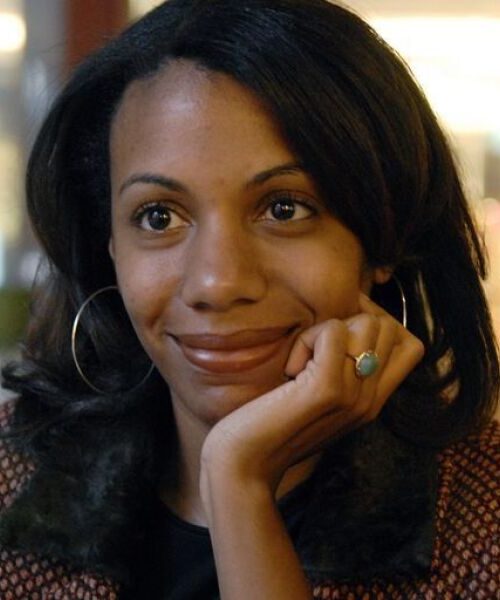 “Natalie Moore (pictured): The WBEZ reporter, host and editor signed off before the [Labor Day] holiday weekend. The broadcaster and author is leaving the station to teach journalism at Northwestern University. “Moore will continue to occasionally write columns for the Sun-Times.
“Natalie Moore (pictured): The WBEZ reporter, host and editor signed off before the [Labor Day] holiday weekend. The broadcaster and author is leaving the station to teach journalism at Northwestern University. “Moore will continue to occasionally write columns for the Sun-Times.
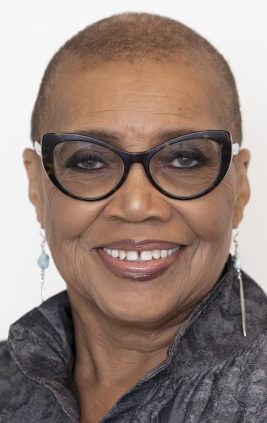 “Mary Mitchell (pictured): Longtime Sun-Times columnist Mary Mitchell wrote her last column (for real) at the end of last week. She wrote about Chicago and race for nearly 35 years.
“Mary Mitchell (pictured): Longtime Sun-Times columnist Mary Mitchell wrote her last column (for real) at the end of last week. She wrote about Chicago and race for nearly 35 years.
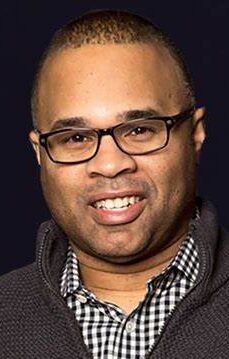 “Laurence Holmes (pictured): The popular sports talk host is still on the radio, but his Bears post-game show is not returning to television. Holmes led the NBC Sports Chicago program ‘Football Aftershow.’ The panel included former Bears players like Lance Briggs, Matt Forte and Alex Brown. . . .”
“Laurence Holmes (pictured): The popular sports talk host is still on the radio, but his Bears post-game show is not returning to television. Holmes led the NBC Sports Chicago program ‘Football Aftershow.’ The panel included former Bears players like Lance Briggs, Matt Forte and Alex Brown. . . .”
- Halimah Abdullah, the Emancipator: My antiracist journalism journey: How I lost my wings, then reclaimed my sky
- Jeff Agrest, Chicago Sun-Times: In wake of Barstool blowup, Laurence Holmes’ move creates firestorm at The Score (Sept. 23)
- Barrett Sports Media: 670 The Score Host Laurence Holmes Missing Show After Medical Issue (Sept. 18)
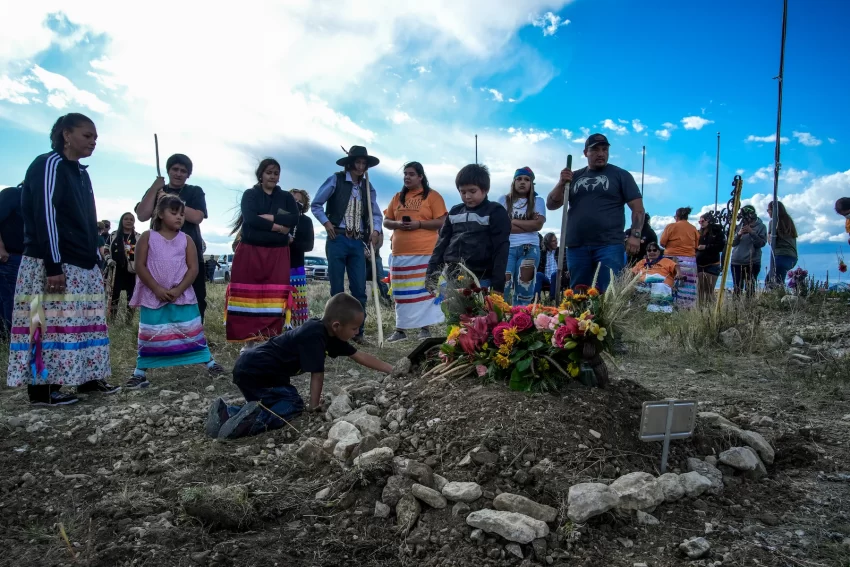
Children use rocks to mark the grave of Almeda Heavy Hair in her family cemetery Sept. 20. (Credit: Jahi Chikwendiu/Washington Post)
3,000+ Died at Native Boarding Schools, WaPo Finds
“A year-long investigation by The Washington Post has documented that 3,104 students died at boarding schools between 1828 and 1970, three times as many deaths as reported by the U.S. Interior Department earlier this year,” the Post reported in an interactive story online and in a special stand-alone section in its Dec. 23 print edition.
“The Post found that more than 800 of those students are buried in cemeteries at or near the schools they attended, underscoring how, in many cases, children’s bodies were never sent home to their families or tribes,” said the story, by Dana Hedgpeth, Sari Horwitz, Joyce Sohyun Lee, Andrew Ba Tran, Nilo Tabrizy and Jahi Chikwendiu.
“The Post’s investigation found the deaths by drawing on hundreds of thousands of government documents that also revealed how children were beaten and harshly punished if they did not adhere to strict rules in the classroom — and in the fields, laundry rooms, kitchens or workshops where they often were forced to spend half their days.
“ ‘These were not schools,’ said Judi Gaiashkibos, executive director of the Nebraska Commission on Indian Affairs, whose relatives were sent to Indian boarding schools. ‘They were prison camps. They were work camps.’
“The causes of death included infectious diseases, malnutrition and accidents, records show. Dozens died in suspicious circumstances, and in some instances the records provide indications of abuse or mistreatment that likely resulted in children’s deaths. A 10-year-old boy was fatally shot in 1912 at an Alaska school, a newspaper reported. A girl in Oregon ‘fell from a high window there & was brought home a corpse’ in 1887, according to a teacher’s diary.
“The findings show gaps in the federal government’s official accounting of what happened to Native American children who were wrested from their homes in the name of assimilation. They come as many tribes — long denied the chance to mourn and bury their dead — are seeking to find their ancestors’ remains and return them home.
“But doing so is complicated by poor recordkeeping and uncertainty about the locations of many burial sites. While some cemeteries, like the one at Carlisle that held Almeda’s remains, are marked, others are hidden, neglected or have been paved over. . . .” (added Dec. 23)
- Indigenous Journalists Association: IJA announces Albuquerque for 2025 Indigenous Media Conference Aug. 13-15, 2025
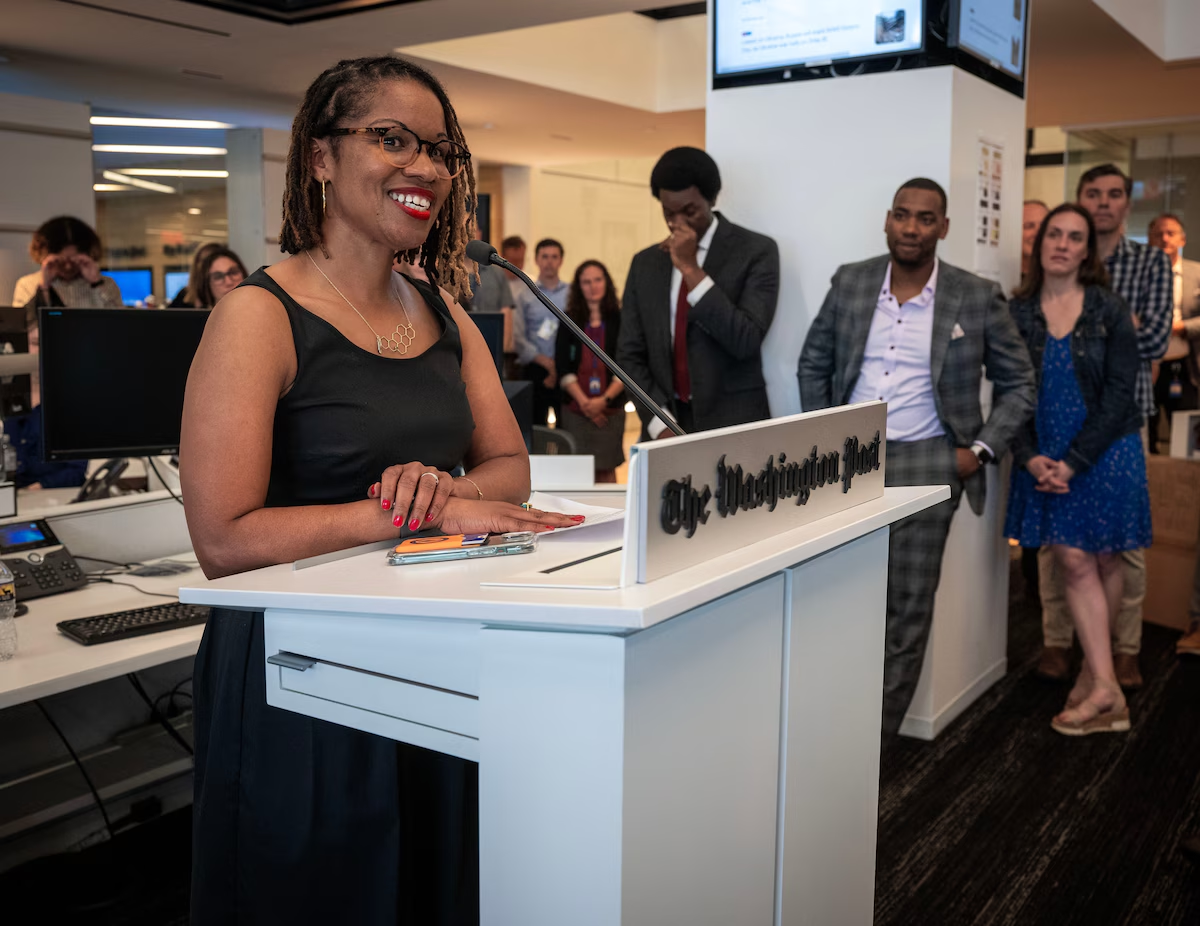
Krissah Thompson, managing editor of diversity and Inclusion, speaks to Washington Post reporters in May as Pulitzer Prizes were announced. (Credit: Bill O’Leary/The Washington Post)
Krissah Thompson Says ‘Yes,’ Kevin Merida ‘No’ to WaPo
Krissah Thompson, a managing editor at The Washington Post, has been given the additional role of editor of WP Ventures, a new initiative at the financially troubled newspaper, while former Managing Editor Kevin Merida, who went on to become executive editor of the Los Angeles Times, turned down an offer to be interviewed for the Post’s top newsroom job, according to news reports. Both are Black journalists.
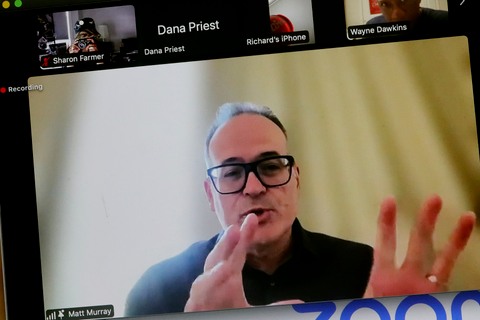 In addition, “Next year, presumably on the earlier side of the first quarter, Washington Post publisher and C.E.O. Will Lewis intends to announce that he has appointed acting executive editor Matt Murray (pictured, by Sharon Farmer) as the newsroom’s permanent chief, according to sources familiar with his plans,“ Dylan Byers reported Friday for Puck. “The news, which Will has been delaying for unspecified reasons, will bring an anticlimactic end to a long and tortured recruitment effort at a storied paper that — as you know, dear reader — has endured a rather miserable and ignominious few years of financial irresponsibility, soul-searching, and chaos.”
In addition, “Next year, presumably on the earlier side of the first quarter, Washington Post publisher and C.E.O. Will Lewis intends to announce that he has appointed acting executive editor Matt Murray (pictured, by Sharon Farmer) as the newsroom’s permanent chief, according to sources familiar with his plans,“ Dylan Byers reported Friday for Puck. “The news, which Will has been delaying for unspecified reasons, will bring an anticlimactic end to a long and tortured recruitment effort at a storied paper that — as you know, dear reader — has endured a rather miserable and ignominious few years of financial irresponsibility, soul-searching, and chaos.”
The goal of WP Ventures “is to explore how The Washington Post can effectively grow our reach, revenue and relevance with new audiences in a rapidly changing media landscape,” Murray said Friday in a news release. “A particular focus has been expanding our presence on social media and creating new commercial opportunities for consumer and lifestyle journalism, while accelerating innovation and cross-company collaboration.”
Puck’s Byers also reported, “If all goes according to Lewis’s hopes, Matt may one day find himself with oversight of a reinvigorated newsroom. In private conversations, Will has articulated a multifaceted vision for the Post’s future: the core news report, led by Matt; the opinion section, led by David Shipley; the ‘third newsroom’ WP Ventures arm for new initiatives and verticals, which will be helmed by Krissah Thompson, reporting in to Matt; and a separate WP Intelligence policy-professional subscription service, led by Marty Kady.
“But getting there will take a considerable amount of time, since the negativity and ennui are unlikely to abate upon the news that Lewis’s grand plan for the paper is to promote the guy who is already running the place.”
Murray was to serve only temporarily as executive editor, Lewis announced June 1. After Election Day, he was to hand over the reins of leadership for the newsroom’s core reporting areas — including politics, investigations, business, technology, sports and features — to Robert Winnett, a British journalist who is deputy editor of Telegraph Media Group.
However, Winnett decided not to take the Post job, his company announced June 21, after Lewis and Winnett faced accusations of having used unethical newsgathering practices in Britain.
Meanwhile, Murray deputized Thompson, managing editor for diversity and inclusion, in July to “run the newsroom process building the third newsroom.” On Friday, Murray said Thompson “has earned the trust of our newsroom and will continue to foster the kind of collaboration across Ventures, the newsroom and the rest of the company that is necessary for this new effort to succeed.”
Before Byers’ report that Murray was said to have the top editor’s job permanently, Mike Allen and Sara Fischer, writing for Axios, confirmed that a search firm reached out to Merida, among others, but neither he nor Steven Ginsburg, another former managing editor, expressed interest in the role. Charlotte Klein reported the same in November for New York magazine.
Merida is likely the only Black journalist ever considered for the Post’s top newsroom job. The late Robert C. Maynard, who went on to become publisher of the Oakland (Calif.) Tribune, said in the 1970s that he left the Post, where he had been a national correspondent and ombudsman, because he knew he could never become editor.
 Merida collaborated with visual historian Deborah Willis in producing “Kamala: Her Historic and Auspicious Sprint to the White House,” a cofee-table book primarily of photos that was published Tuesday by Simon & Schuster.
Merida collaborated with visual historian Deborah Willis in producing “Kamala: Her Historic and Auspicious Sprint to the White House,” a cofee-table book primarily of photos that was published Tuesday by Simon & Schuster.
“Kamala Harris’ candidacy demonstrated that the unthinkable could happen. A woman, Black and Asian, with scant time to prepare for such an epic challenge, breathed hope into a deeply divided America, turning a moribund race for the presidency into a contest stocked with optimism and possibility,” Merida wrote in the introduction.
- Mike Allen, Axios: Scoop: Kara Swisher’s long-shot Post bid
- Justin Baragona, the Independent: LA Times staffers say billionaire owner’s pro-Trump meddling worse than previously reported
- James Rainey, Los Angeles Times: Patrick Soon-Shiong’s controversial shakeup at the L.A. Times: ‘Bias meter,’ opinion upheaval and a call for growth (Dec. 15)
- Queenie Wong, Los Angeles Times: Tech billionaires Zuckerberg, Bezos and Altman help bankroll Trump’s inauguration. What to know (Dec. 13)
(may not be visible in some browsers; please consider using another browser to view.)
Did President Biden Do Enough for Black People?
From WGBH in Boston: Did President Biden do enough for Black people? GBH News’ Paris Alston asked, and got thoughtful answers. (video, above)
- Ja’han Jones, MSNBC: How Harmeet Dhillon could upend the Justice Department’s safeguarding of civil rights (Dec. 10)
- Legal Defense Fund: LDF Opposes Nomination of Harmeet Dhillon as Assistant Attorney General (Dec. 11)
- B.A. Parker, Christina Cala, Leah Donnella, Gene Demby, Dalia Mortada, Courtney Stein, Jess Kung , Xavier Lopez, Jasmine Romero, Veralyn Williams, “Code Switch,” NPR: Dreaming of a Black Utopia in Trump’s America (Dec. 11)
- Dave Zirin, The Nation: Trump Invites a Killer to His Luxury Box
Jennifer Cunningham Now Top Editor at Newsweek
Jennifer Cunningham, a veteran of Business Insider, Interactive One, Moguldom Media Group and the Daily News in New York, has been promoted from executive editor to editor-in-chief of Newsweek, the publication announced Friday.
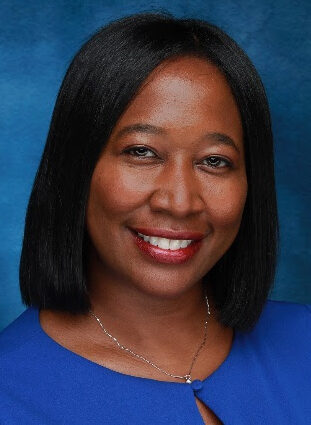 Cunningham (pictured) will be “leading Newsweek’s resurgence as a leading global news organization,” Dev Pragad, CEO and owner, said in a news release.
Cunningham (pictured) will be “leading Newsweek’s resurgence as a leading global news organization,” Dev Pragad, CEO and owner, said in a news release.
The newsmagazine, once owned by the Washington Post Co., and a major player among magazines as chief competitor to Time, is not what it once was.
“What is Newsweek? Just kidding,” messaged Samir Husni, founder and retired director of the Magazine Media Center and known as “Mr. Magazine.’
“The magazine that [celebrity editor] Tina Brown killed has come to life several times after she published ‘The Last Print Issue.’ I give a lot of credit to the current and previous owners who did not give up on the brand. Hopefully under the new editor in chief, the magazine will engage in a good marketing campaign to remind people that the magazine is still there. Only a good story combined with good journalism will remind folks that the magazine is still here.
“But no matter what, the days Newsweek was a good competitor to Time are long gone and nothing it do will change that. At least Time has benefited from its special issues including the Person of the Year. Newsweek has nothing to depend on. That why I said we need good solid journalism to help revive what once was a good competitive newsweekly.”
Cunningham said on LinkedIn that with her colleagues, “Together, we will continue to uphold the highest standards of journalism and make a meaningful impact in the world. I am excited about the road ahead!”
Maria Elena Salinas Leaving ABC News
 “María Elena Salinas (pictured), one of the most iconic figures in Spanish-language journalism, announced her departure from ABC News after nearly three years,” Paola Hernández reported Monday for Latin Times. “Surprisingly, her announcement came just hours before Jorge Ramos, her longtime co-anchor on ‘Noticiero Univisión,’ bid farewell to the network after decades working there.
“María Elena Salinas (pictured), one of the most iconic figures in Spanish-language journalism, announced her departure from ABC News after nearly three years,” Paola Hernández reported Monday for Latin Times. “Surprisingly, her announcement came just hours before Jorge Ramos, her longtime co-anchor on ‘Noticiero Univisión,’ bid farewell to the network after decades working there.
“In an emotional message shared on her social media, Salinas reflected on her time at the network, highlighting the stories she was able to tell and the impact she had on the Latino community. ‘Today is my last day at ABC News. It has been a journey,’ she wrote on Instagram. . . .
“Salinas joined ABC News in March 2022 after a stellar career of more than 30 years at Univision, where she co-anchored ‘Noticiero Univisión.’
“Her work not only made her a household name among Spanish-speaking audiences but also allowed her to address critical issues affecting the Latino community in the U.S. ‘When I left Univisión, I said I wanted to keep telling our stories to different audiences on different platforms,’ Salinas remarked, reaffirming her dedication to journalism. . . .”
Asian Americans Want Radio Talker Disciplined
A group of Asian American associations is calling on KFI-AM 640 to discipline talk show host Bill Handel over several anti-Asian remarks he’s made on the air, Christine Samra reported Wednesday for KTLA in Los Angeles.
 “The organizations include the Asian American Journalists Association, its Los Angeles chapter and the Media Action Network for Asian Americans. They are asking the radio station to suspend Handel without pay, make a formal apology and agree to perform community service.
“The organizations include the Asian American Journalists Association, its Los Angeles chapter and the Media Action Network for Asian Americans. They are asking the radio station to suspend Handel without pay, make a formal apology and agree to perform community service.
“MANAA has called out Handel for promoting stereotypes by repeatedly making remarks about Chinese and Koreans eating cats and dogs.
“The organization noted five incidents this year alone.
“During a May 21 conversation urging the adoption of dogs to prevent them from being euthanized, Handel said ‘You just can’t have Korean people do it.’ When he was slammed . . . Handel claimed the station came ‘this close’ to doing a show in Korea that focused on restaurants serving dog.”
- Victor Blackwell with Guy Aoki, CNN: Radio host under fire for anti-Asian comments, including one for ‘dog meat soup’
$1.2 Million to Bring News to Communities of Color
“The Pivot Fund has awarded over $1.2 million in grants to grassroots news organizations serving communities of color from the Pacific Northwest to South Florida. This marks a significant expansion of The Pivot Fund’s mission to empower local journalism and foster a more inclusive media landscape,” the fund announced Wednesday.
“This funding round supports eight independent media outlets that play a critical role in their communities by providing essential news coverage, amplifying marginalized voices, and fostering civic engagement. The grantees represent diverse regions and focus areas, underscoring The Pivot Fund’s commitment to inclusive media that reflects the richness of our society.
 “We began by asking communities of color who they trusted for news and information. Their answers led us to incredible organizations producing high-quality journalism despite limited resources,” said Tracie Powell (pictured), founder and CEO of the fund.
“We began by asking communities of color who they trusted for news and information. Their answers led us to incredible organizations producing high-quality journalism despite limited resources,” said Tracie Powell (pictured), founder and CEO of the fund.
This round of funding supports Underscore Native News – Pacific Northwest; Conecta Arizona – Arizona; the Kansas City Defender; the Harvey World Herald – Illinois; the Mississippi Free Press; Hy-Lo News – South Florida; Osage News, Oklahoma; and Black By God: The West Virginian.
The Pivot Fund continues to support half a dozen newsrooms in Georgia and across the south, the group said.
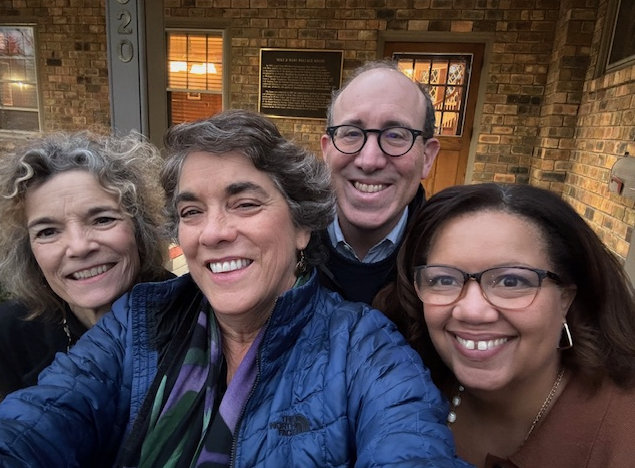
From left, Kathy Kiely, the Lee Hills chair in Free-Press Studies at the Missouri School of Journalism; Dawn Garcia, director of the John S. Knight Journalism Fellowships program at Stanford; Joel Simon, founding director of the Journalism Protection Initiative, and Lynette Clemetson, director of the Knight-Wallace Fellowships at the University of Michigan. (Credit: Journalism Protection Initiative)
J-Programs, Knight Act on Threatened Journalists
Thd Journalism Protection Initiative has announced a major new initiative to support journalists at risk around the world — the Knight Press Freedom Fellowships.
“Thanks to a $2M grant from the Knight Foundation, the Journalism Protection Initiative has established a program that places threatened journalists at leading US academic institutions, allowing them to continue their work. The effort is designed to fill a gap by supporting journalists who may not be eligible to participate in traditional fellowship programs because of their family circumstances or challenges obtaining a visa, or because they are experiencing a true emergency that requires immediate action,” the initiative announced.
The move comes as the press freedom group Reporters Without Borders, in its 2024 round-up, on Dec. 12 reported “an alarming intensification of attacks on journalists — especially in conflict zones, where over half of the news professionals who lost their lives this year perished.
“Gaza stands out as the most dangerous region in the world, with the highest number of journalists murdered in connection with their work in the last five years. . . . What’s more, 550 journalists are currently imprisoned worldwide, a 7% increase from last year. This violence — often perpetrated by governments and armed groups with total impunity — needs an immediate response. RSF calls for urgent action to protect journalists and journalism.”
The Knight Press Freedom Fellowship program is supported by the work of an advisory board chaired by Joel Simon, founding director of the initiative, based at the Craig Newmark Graduate School of Journalism City University of New York and former executive director of the Committee to Protect Journalists.
Advisory board members are Lynette Clemetson, director of the Knight-Wallace Fellowships at the University of Michigan; Dawn Garcia, director of the John S. Knight Journalism Fellowships program at Stanford; Kathy Kiely, the Lee Hills chair in Free-Press Studies at the Missouri School of Journalism; Lucy Westcott, emergencies director at the Committee to Protect Journalists; and Jim Brady, vice president of journalism at Knight Foundation.
In addition to the Newmark School, participating institutions include the Knight-Wallace Fellowships at the University of Michigan, the John S. Knight Fellowship Program at Stanford, and the Missouri School of Journalism at the University of the Missouri.
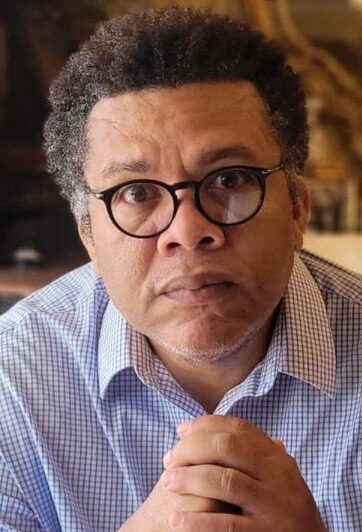 Separately, Clemetson told Journal-isms Tuesday that “Thanks to collaborative work from Medill School dean Charles Whitaker and special projects director Louise Kiernan at Northwestern,” exiled Haitian journalist Roberson Alphonse (pictured), winner of this year’s National Association of Black Journalists’ Percy Qoboza Award for a foreign journalist, “is headed to the Medill School in January as a journalist in residence for the coming year.
Separately, Clemetson told Journal-isms Tuesday that “Thanks to collaborative work from Medill School dean Charles Whitaker and special projects director Louise Kiernan at Northwestern,” exiled Haitian journalist Roberson Alphonse (pictured), winner of this year’s National Association of Black Journalists’ Percy Qoboza Award for a foreign journalist, “is headed to the Medill School in January as a journalist in residence for the coming year.
“And I was in France last week to work with a news org called Forbidden Stories, an investigative journalism collaborative, dedicated to finishing and publishing the work of journalists who have been killed. Conceived by French journalist Laurent Richard during his 2016-17 Knight-Wallace Fellowship, seven years later Forbidden Stories has an Emmy, two Polk Awards, several European journalism honors and 28 dedicated employees doing amazing work around the world.”
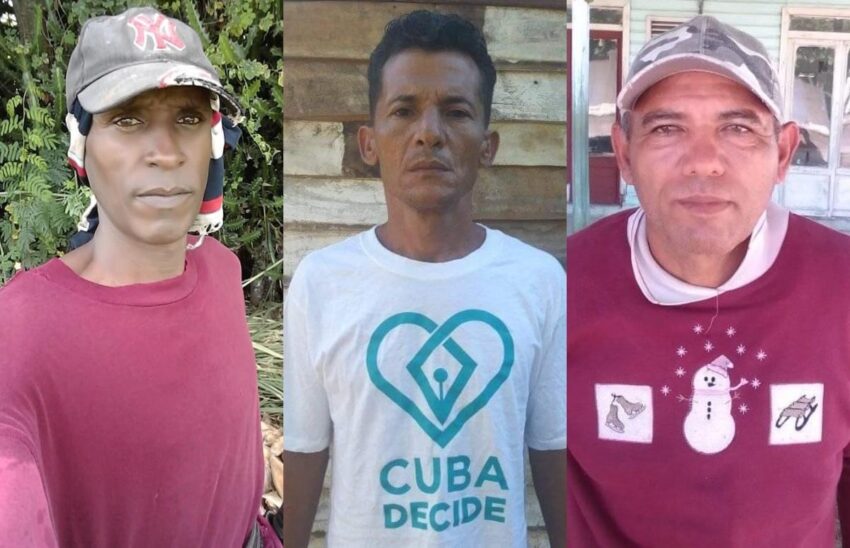
Activists Gustavo Colás Castillo, Yoan Ricardo Llerena and Edilberto Arzuaga Alcalá. (Credit: ICLEP; photos taken from their social networks.)
In Cuba: Arrests of Journalists, Death of Political Prisoner
Independent Cuban journalist Henry Constantín Ferreiro completed 48 hours of arbitrary detention by the Cuban regime Saturday, while another journalist has remained under house arrest and the United States has condemned the death, perhaps killing, of still another political prisoner, according to news reports.
This, as the Cuban Institute for Freedom of Expression and the Press, an advocacy group for independent journalists, reported that “Violations of freedom of expression and of the press in Cuba continued with alarming figures during the month of November, with citizens without attachment to any organization opposed to the regime or political activism being the most affected by the repression of the dictatorship. The Cuban Institute for Freedom of Expression and the Press (ICLEP) registered a total of 65 violations during that month, of which 53 correspond to freedom of expression and 12 to freedom of the press.
“During November, 31 ordinary citizens were victims of aggressions, the vast majority of them for taking to the streets to protest against the deplorable living conditions on the island and for exercising their legitimate right to express themselves,” the group said. Eight journalists were among the victims, Journal-isms correspondent Julio Antonio Rojas reported from Havana.
The monthly report from ICLEP came Dec. 9, less than a week after a delegation from historically Black Morgan State University and guests such as Pulitzer Prize-winner Nikole Hannah-Jones went to Cuba to stage a “first-ever Morgan State University School of Global Journalism and Communication Symposium: ‘Banning Black Books, Silencing Black Voices: America’s Apartheid.’ ”
As they were protesting book banning and “apartheid” in the United States, the Cuban government arrested activist Yoan Ricardo Llerena after State Security searched his home and found copies of the Universal Declaration of Human Rights in advance of the United Nations-declared International Human Rights Day.
The activist is accused of the alleged crimes of attack and disobedience, according to statements by his wife, Disnelbys Vidal, to Martí Noticias. He could be sentenced to two or three years in prison, she said.
“His physical integrity is at risk because his state of health is deteriorating due to prison conditions. Yoan suffers from migraine, chronic bronchitis turned into asthma, generalized osteoarthritis, inflammation and prostate pain, hemorrhoid and is easily stressed in contexts of abusive and illegal confinement and interrogation,” Yaxys Cires, director of strategy of the Observatorio Cubano de Derechos Humanos (OCDH), an independent Cuban civil society organization, told ADN Cuba.
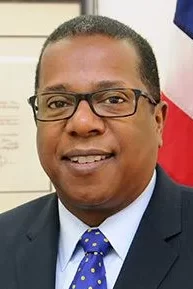 A week earlier, Brian A. Nichols (pictured), U.S. assistant secretary of state for Western Hemisphere affairs, spoke out about the death of Cuban political prisoner Manuel de Jesús Guillén Esplugas, who was serving a six-year sentence for recording and publishing videos of the July 11, 2021, protests known as 11J, in which an estimated 100,000 to 500,000 Cubans took part.
A week earlier, Brian A. Nichols (pictured), U.S. assistant secretary of state for Western Hemisphere affairs, spoke out about the death of Cuban political prisoner Manuel de Jesús Guillén Esplugas, who was serving a six-year sentence for recording and publishing videos of the July 11, 2021, protests known as 11J, in which an estimated 100,000 to 500,000 Cubans took part.
In a message posted on social media, Nichols lamented the news, calling it “tragic” and pointing to allegations of torture as part of the circumstances surrounding the young man’s death in a Cuban prison.
In 2023, the Inter-American Press Association (IAPA) had denounced another arrest of Constantín Ferreiro and demanded his immediate release.
Dorisbel Guillen Cruz of ADN Cuba said of this current arrest, “ ‘The official pretext for his arbitrary detention was that I violated the legal control over me in [the city of] Camagüey for being CR [counter-revolutionary] and illegal in Havana,’ Constantín said in a phone call.’ ” Constantin’s organization also posted on Facebook.
The report continued, “Since Thursday morning, amid power outages and public tension, journalist Juan Manuel Moreno Borrego, director of the media outlet Amanecer Habanero, has had to remain under house arrest until further notice. Likewise, Yasser Toledo, director of the media outlet Páginas Villareñas, was summoned for questioning, while other activists on the island have been ‘warned’ by the dictatorship.
“Moreno Borrego says that police and counterintelligence agents of the regime visited him on Thursday morning to warn him, under threat of imprisonment, that he was obliged to remain in his home until further notice.”
Meanwhile, “The Cuban Anti-Communist Foundation and its president, Cuban influencer Alexander Otaola, have called for a demonstration on January 28th at 9:00 am in Washington. The meeting will take place in Lafayette Square, located in front of the White House.
“The goal of the demonstration is to demand the immediate release of political prisoners on the island and for the United States to declare that Cuba represents a danger to its national security.” ADN Cuba reported Thursday.
Today, “there are nearly 1,000 unjustly detained political prisoners, more than any time before in recent Cuban history,” Enrique Roig, U.S. deputy assistant secretary in the Bureau of Democracy, Human Rights, and Labor told the Organization of American States on Dec. 11, Human Rights Day 2024.
“Around 700 of those were unjustly detained simply for peacefully protesting in July 2021. Cuba subjects its political prisoners to inhumane conditions, beatings, and psychological torture. The recent death of Manuel de Jesús Guillén Esplugas in prison illustrates the grave risks political prisoners face under this regime.”
- CiberCuba: Cuban regime evacuates staff from its embassy in Syria: “We have been through hell” (Dec. 13)
- CiberCuba: American actor Danny Glover in Cuba: “There are many lessons to learn here.” (Dec. 11)
- CubaNet: US Doctors Operate on 70 Cubans with Arthritis and Other Bone Conditions in Havana (Nov. 30)
- CubaNet: The fall of Syria shakes Havana (Dec. 9)
- Race & Equality, Institute on Race, Equality and Human Rights (Brazil): In Cuba, Extreme Poverty Mainly Affects People of African Descent on the Island (Oct. 30)
- U.S. Mission to the Organization of American States: OAS Commemorates Human Rights Day 2024 (Dec. 11)

Credit: Syrian Center for Journalistic Freedoms
A Call for Justice Over Assad’s Killing of Journalists
“Since 2011, Bashar al-Assad and his allies killed more than 181 journalists because of their work,” Reporters Without Borders said Dec. 10.
“On 9 December 2024, the day the regime fell into the hands of the militant group Hayat Tahrir al-Sham (HTS), 23 journalists were behind bars and ten were missing, including seven victims of enforced disappearances. Reporters Without Borders (RSF) welcomes the end of one of the most oppressive regimes in modern history, which caused Syria to come in 179th place out of 180 countries in the latest World Press Freedom Index. RSF demands justice for the journalists who were killed, injured, imprisoned, and disappeared.
“The country’s future leaders must ensure a new era of press freedom.
“Journalists were bombed by the Syrian army and its Russian allies while doing their job, targeted by government snipers, tortured, and murdered in Assad’s prisons. The killings of 181 journalists by the Syrian regime and its supporters — 161 by regime forces and 17 in Russian airstrikes, according to RSF data — must not go unpunished. . . .”
- Committee to Protect Journalists: CPJ calls on new Syrian leaders to protect journalist safety, hold Assad’s media persecutors to account (Dec. 11)
- Committee to Protect Journalists: 2 Kurdish journalists killed in suspected Turkish drone attack in northern Syria
Survey Finds No Palestinians on Sunday Talk Shows
“Since October 2023, NBC’s Meet the Press, ABC’s This Week, and CNN’s State of the Union have not featured a single Palestinian guest,” Adam Johnson and Othman Ali wrote Wednesday for The Nation.
“A survey of a year’s worth of Palestine-Israel coverage by four Sunday morning news shows — NBC’s Meet the Press, ABC’s This Week With George Stephanopoulos, CBS’s Face the Nation, and CNN’s State of the Union with Jake Tapper and Dana Bash — reveals a startling statistic: With the exception of one interview, the Sunday shows covered and debated the so-called ‘Israel-Hamas war’ for 12 months without speaking to a single Palestinian or Palestinian American.
“This report is part three of our Nation series detailing how center-left media outlets helped sell, downplay, and provide cover for the Biden administration’s war on Gaza. Parts 1 and 2 can be read here and here. . . .”
- Committee to Protect Journalists: Israeli forces kill at least 4 Gaza journalists in the past week
- Reporters Without Borders: Israel: RSF condemns the attacks on media independence by the government of Benyamin Netanyahu (Nov. 21)
Short Takes
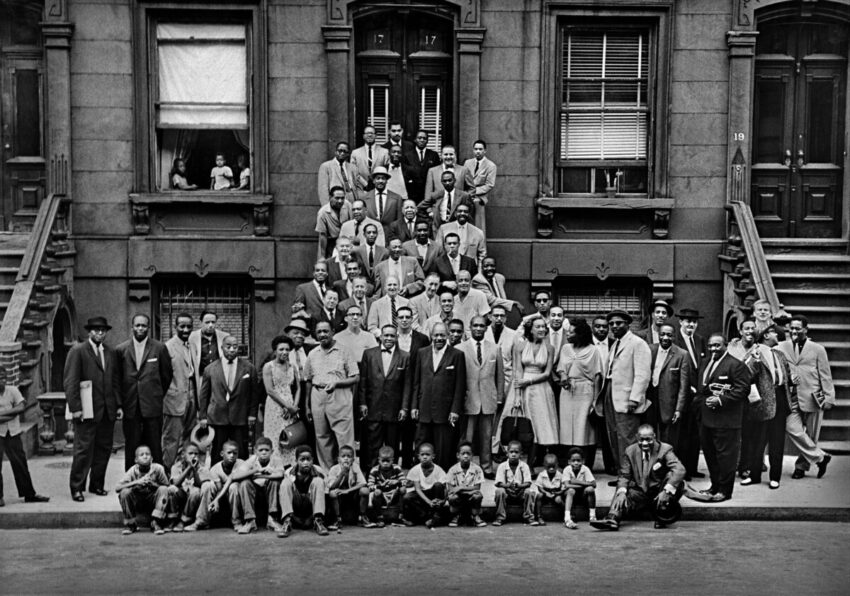
- “On Aug. 12, 1958, Art Kane gathered 58 jazz notables in front of an East 126th St. brownstone for a group portrait,” Hank Shteamer wrote Dec. 9 for The New York Times. ” Only one of its subjects is still alive: the saxophonist Sonny Rollins, 94, who spoke in a phone interview about the image’s power at a time of pervasive segregation and racism. . . .”
-
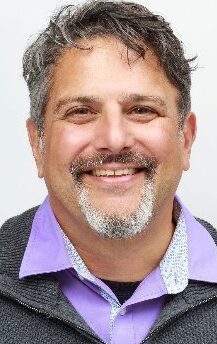 “On Tuesday, the Axios Latino newsletter announced that its final edition would be published on Thursday. This marks the end of a project that launched in 2021 as a partnership with Noticias Telemundo,” Julio Ricardo Varela (pictured) reported Thursday for The Latino Newsletter. “Later on Thursday, Axios senior reporter Russell Contreras wrote a personal essay about why it is important to cover Latino communities. Part of Contreras’ story focused on his grandmother Guadalupe ‘Lita’ Ramos and her story. . . .” Varela added, “The end of Axios Latino signals more than just the loss of a newsletter. It reflects the challenges Latino-focused journalism faces in sustaining itself within American mainstream media. . . . Its closure is a step backward at a time when diverse and thoughtful reporting about U.S. Latino communities is needed more than ever.”
“On Tuesday, the Axios Latino newsletter announced that its final edition would be published on Thursday. This marks the end of a project that launched in 2021 as a partnership with Noticias Telemundo,” Julio Ricardo Varela (pictured) reported Thursday for The Latino Newsletter. “Later on Thursday, Axios senior reporter Russell Contreras wrote a personal essay about why it is important to cover Latino communities. Part of Contreras’ story focused on his grandmother Guadalupe ‘Lita’ Ramos and her story. . . .” Varela added, “The end of Axios Latino signals more than just the loss of a newsletter. It reflects the challenges Latino-focused journalism faces in sustaining itself within American mainstream media. . . . Its closure is a step backward at a time when diverse and thoughtful reporting about U.S. Latino communities is needed more than ever.”
- A new report by the San Francisco-based visual media organization CatchLight and the Rural News Network “highlights the challenges rural newsrooms face in producing visual journalism. From limited staff to digital divides, these barriers impact the ability of local outlets to reflect their communities through powerful visual storytelling,” the organization said. “To bridge these gaps, CatchLight launched the Local Visual Desk program, offering high-quality visuals and collaborative resources to community-based newsrooms. The initiative, now expanding nationwide, is accepting new members on a rolling basis and will open applications in January for up to 20 subsidized full-time photographer positions in local newsrooms nationwide. . . .”
- “A new ProPublica analysis shows the extent to which private schools segregate students,” the investigative newsroom announces. “The news organization dug into decades of private and public school data kept by the U.S. Department of Education, including a survey of the nation’s private schools conducted every other year by its National Center for Education Statistics. Outside of academia, few people know about this data. In Amite County, Mississippi, the divide is especially stark. One private school has never — over nearly 30 years of surveys — reported enrolling more than one Black student. . . . “

- “It’s hard to dispel a longtime rumor, but it’s important — especially when the truth is just as horrifying,“ Marah Eakin wrote Monday for Current. “With 1912: The Forsyth County Expulsion and its Aftermath, a new podcast from WABE and the Atlanta History Center, the two local institutions collaborated to do just that. The station says, “1912 tells the story of the expulsion of more than 1,000 Black residents from Forsyth County, Georgia and its lasting impact on the families affected. We’ll explore how a combination of popular myth and generations of displacement contributed to the attempted erasure of an entire Black community. . . .”
- “We want to honor someone very special to the ‘News Hour,’ co-anchor Geoff Bennett told the “PBS News Hour” audience on Dec. 13. “Behind every camera cue, every smooth transition, every seamless moment, there’s been one person working tirelessly behind the scenes to make it all happen. Our stage manager and studio supervisor Loretta Rodgers is retiring after 38 remarkable years with WETA and the News Hour.” Co-host Amna Nawaz added, “Early in her career, Loretta was one of very few women of color working in television production in the country. Over the years, she has set the standard for excellence here in a number of different roles.” “Washington Week With the Atlantic,” another show produced at WETA, delivered its own tribute to Rodgers later that night.
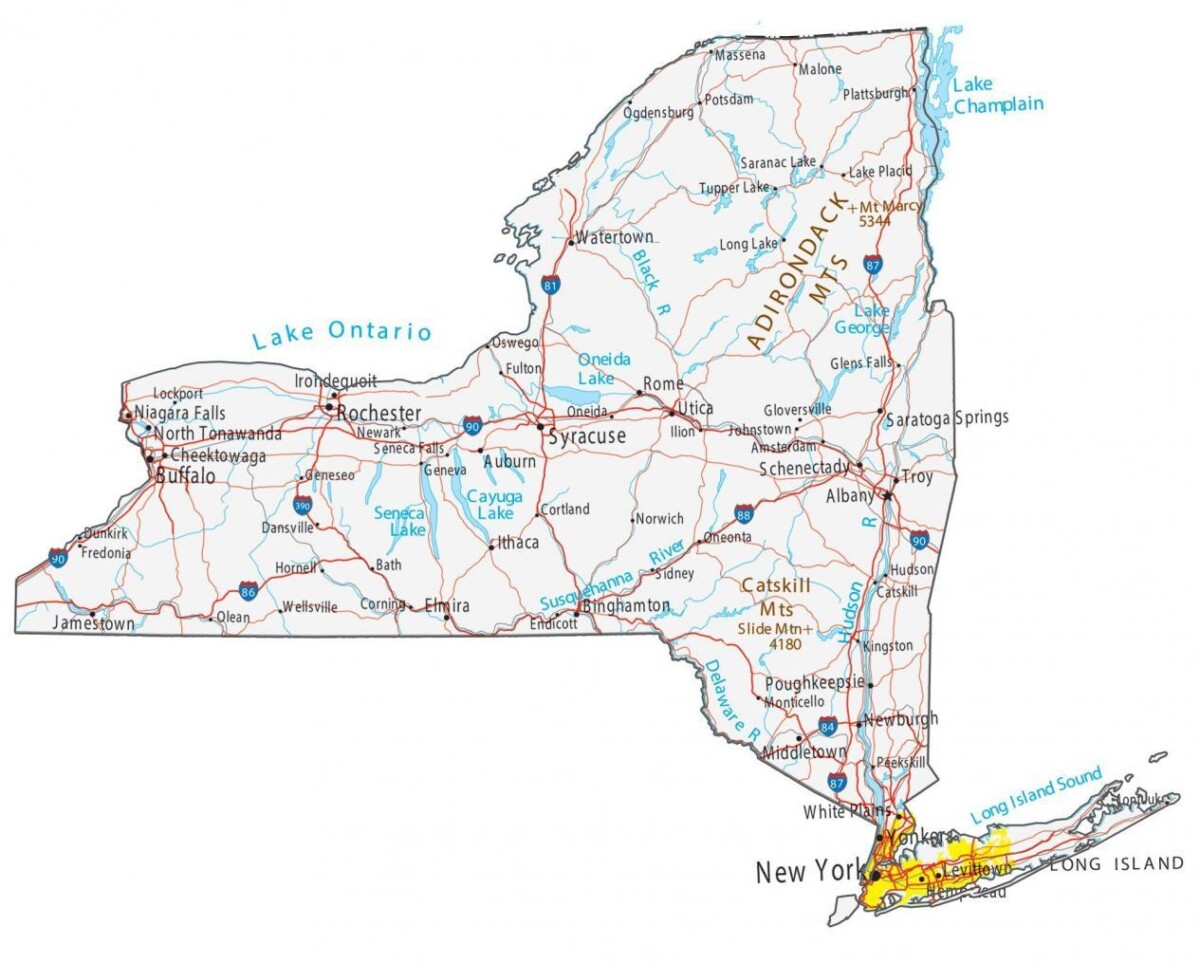 New York Focus, a nonprofit, nonpartisan newsroom covering state and local politics, traveled across the state to meet with communities about their local news needs,” Alex Arriaga and Kate Harloe reported Dec. 11 for the organization. Among their findings: “Residents explained that the decline of local news has left a major hole when it comes to finding basic civic information about municipal, town, village, county, and even state government. The New Yorkers we surveyed expressed a deep frustration at the lack of transparency they experience at all levels of government,” “People expressed a deep desire to engage with the state’s political processes to address issues in their communities, but felt generally unable to access or understand those processes,” and “A lack of resources often leaves newsrooms feeling unable to provide the basic level of civic information that community members request and need.”
New York Focus, a nonprofit, nonpartisan newsroom covering state and local politics, traveled across the state to meet with communities about their local news needs,” Alex Arriaga and Kate Harloe reported Dec. 11 for the organization. Among their findings: “Residents explained that the decline of local news has left a major hole when it comes to finding basic civic information about municipal, town, village, county, and even state government. The New Yorkers we surveyed expressed a deep frustration at the lack of transparency they experience at all levels of government,” “People expressed a deep desire to engage with the state’s political processes to address issues in their communities, but felt generally unable to access or understand those processes,” and “A lack of resources often leaves newsrooms feeling unable to provide the basic level of civic information that community members request and need.”
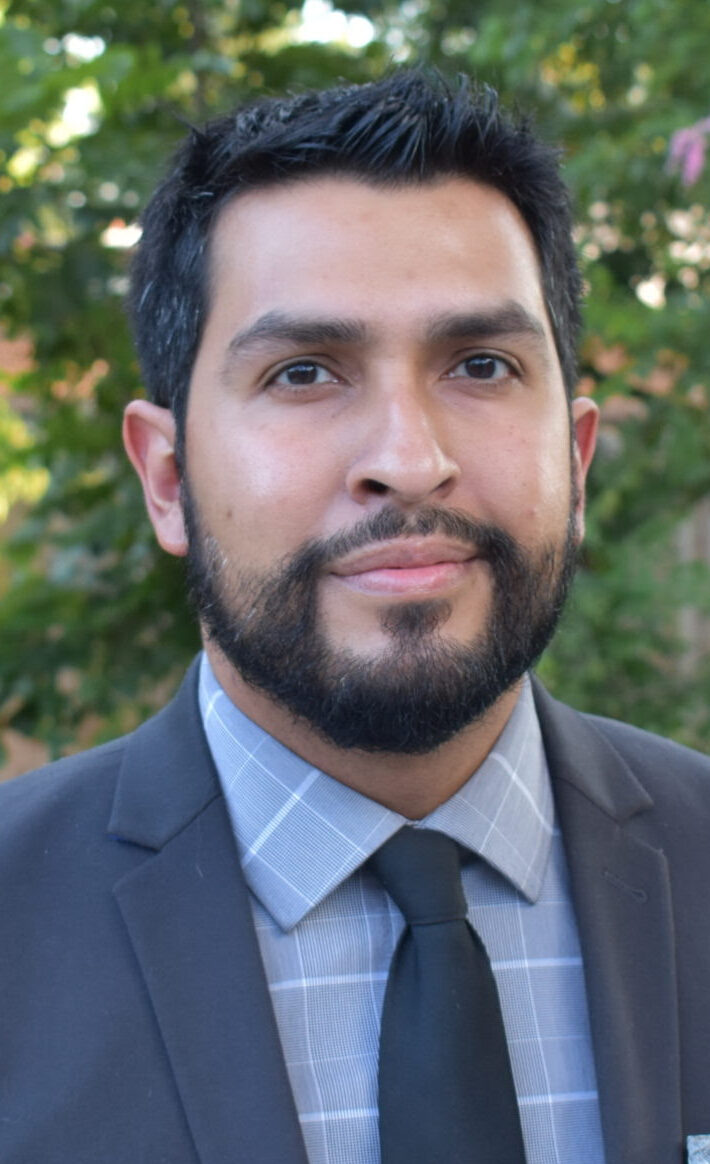 Discussing the future of diversity, belonging, equity and inclusion efforts for the Nieman Lab’s annual compilations for the next year, Francisco Vara-Orta (pictured) of Investigative Reporters & Editors said, “What I hear — especially among DBEI educators — is proactive talk about what we can do to bring everyone along, to move from what can feel like shaming to inspiring others to reconsider their outlook. There are hopes to focus on combating disinformation in news deserts, in predominantly white and rural spaces as much as in immigrant communities where English isn’t the dominant language. Some see the seesaw of election outcomes in recent years as a real opportunity to motivate people of different backgrounds to find common ground instead of icing each other out. Determining who offers the olive branch first seems to cause the most consternation.”
Discussing the future of diversity, belonging, equity and inclusion efforts for the Nieman Lab’s annual compilations for the next year, Francisco Vara-Orta (pictured) of Investigative Reporters & Editors said, “What I hear — especially among DBEI educators — is proactive talk about what we can do to bring everyone along, to move from what can feel like shaming to inspiring others to reconsider their outlook. There are hopes to focus on combating disinformation in news deserts, in predominantly white and rural spaces as much as in immigrant communities where English isn’t the dominant language. Some see the seesaw of election outcomes in recent years as a real opportunity to motivate people of different backgrounds to find common ground instead of icing each other out. Determining who offers the olive branch first seems to cause the most consternation.”
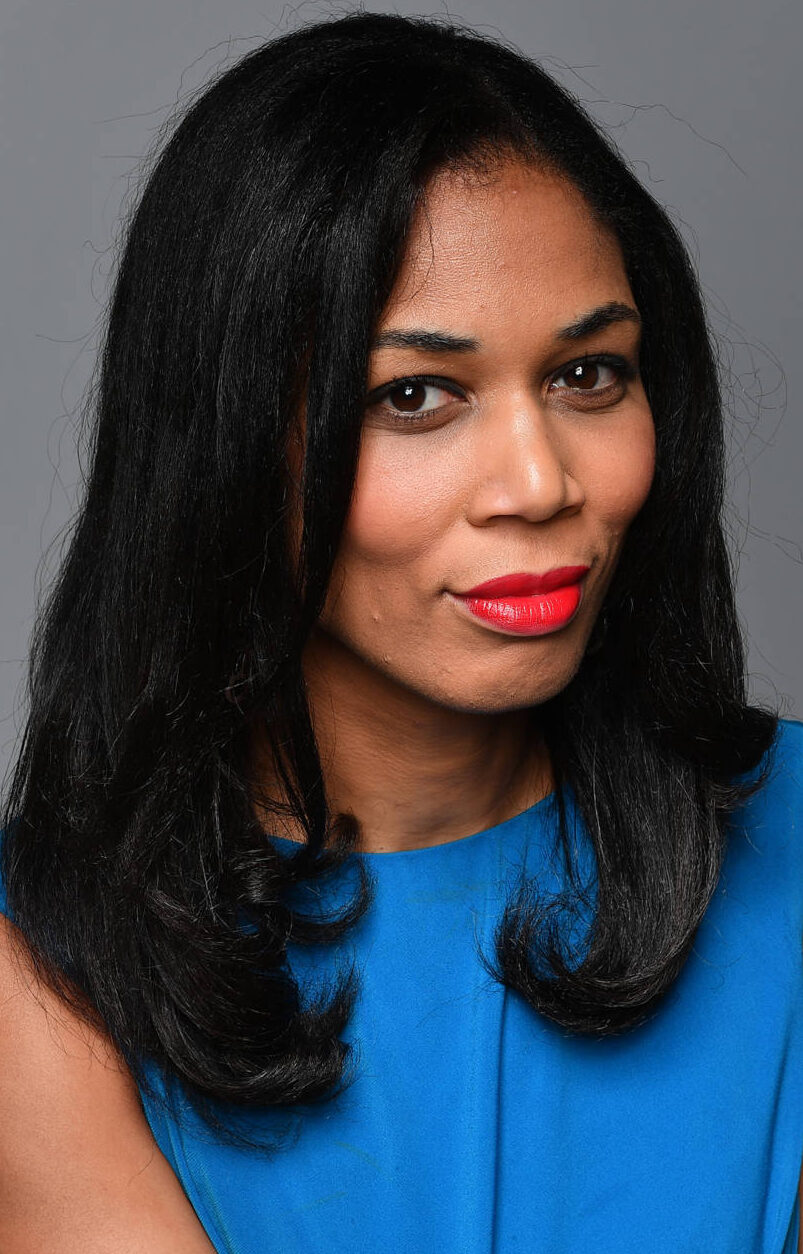 Kimbriell Kelly (pictured), who until January layoffs was Washington bureau chief for the Los Angeles Times, has been named interim investigations editor of the Chicago-based Investigative Project on Race and Equity, board president Laura S. Washington announced Friday. “Kimbriell is a Chicago native who got her start in investigative editing at The Chicago Reporter where her investigation into Countrywide Financial’s subprime mortgage lending led to the nation’s largest fair-lending settlement,” Washington said in an email. When she joined the L.A. Times in 2020, editors said then, “Since joining The Times in Washington as deputy editor for enterprise and investigations, Kimbriell has edited the immigration coverage that led to the bureau’s first Pulitzer Prize in 17 years (second item). She has served as a bridge builder, working closely with counterparts in Los Angeles. . . .”
Kimbriell Kelly (pictured), who until January layoffs was Washington bureau chief for the Los Angeles Times, has been named interim investigations editor of the Chicago-based Investigative Project on Race and Equity, board president Laura S. Washington announced Friday. “Kimbriell is a Chicago native who got her start in investigative editing at The Chicago Reporter where her investigation into Countrywide Financial’s subprime mortgage lending led to the nation’s largest fair-lending settlement,” Washington said in an email. When she joined the L.A. Times in 2020, editors said then, “Since joining The Times in Washington as deputy editor for enterprise and investigations, Kimbriell has edited the immigration coverage that led to the bureau’s first Pulitzer Prize in 17 years (second item). She has served as a bridge builder, working closely with counterparts in Los Angeles. . . .”
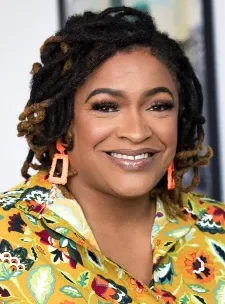 Jess Washington (pictured), CEO, COO and chief finance officer of the Dallas Weekly, has taken the additional title of publisher, she announced on LinkedIn.
Jess Washington (pictured), CEO, COO and chief finance officer of the Dallas Weekly, has taken the additional title of publisher, she announced on LinkedIn.
 “In ‘Scammed,’ a seven-part series, personal finance columnist Michelle Singletary (pictured) deconstructs how one woman lost her life’s savings to a government impersonation scam,” The Washington Post reported. “Singletary spent months interviewing fraud victims, law enforcement, policymakers and victim advocates, and reviewing scores of emails, texts and financial documents to show how scammers exploit human nature and technology to manipulate their victims. Her conclusion? Anyone can be scammed.”
“In ‘Scammed,’ a seven-part series, personal finance columnist Michelle Singletary (pictured) deconstructs how one woman lost her life’s savings to a government impersonation scam,” The Washington Post reported. “Singletary spent months interviewing fraud victims, law enforcement, policymakers and victim advocates, and reviewing scores of emails, texts and financial documents to show how scammers exploit human nature and technology to manipulate their victims. Her conclusion? Anyone can be scammed.”
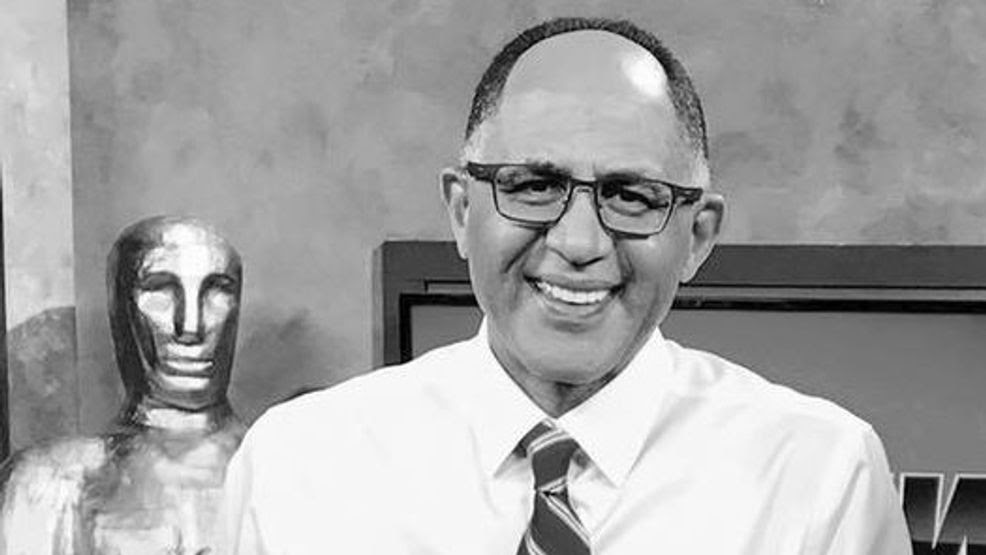 Mark Spain, “a vital anchor in both our newsroom and the community,” died at 64 on Wednesday after a battle with panreatic cancer, Robert Locklear reported Thursday for WSET in Lynchburg, Va. “Since 2015, Mark worked as a lead anchor for our evening and late shows. As a skilled journalist passionate about his field, his role as a worker made him vital to the daily flow of news. And as a human being who cared about making a difference, his nearly ten years at the station saw him mentor dozens of young professionals. His guidance and genuine care for those he worked with made him much more than just a coworker or even a friend – he was a member of the family.”
Mark Spain, “a vital anchor in both our newsroom and the community,” died at 64 on Wednesday after a battle with panreatic cancer, Robert Locklear reported Thursday for WSET in Lynchburg, Va. “Since 2015, Mark worked as a lead anchor for our evening and late shows. As a skilled journalist passionate about his field, his role as a worker made him vital to the daily flow of news. And as a human being who cared about making a difference, his nearly ten years at the station saw him mentor dozens of young professionals. His guidance and genuine care for those he worked with made him much more than just a coworker or even a friend – he was a member of the family.”
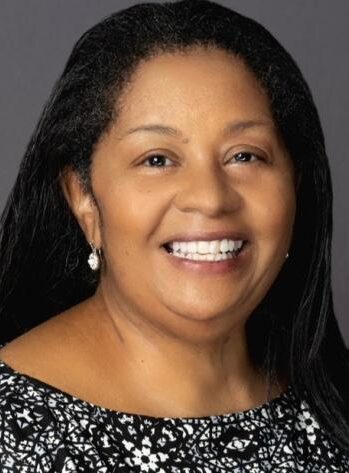 “Geri Tucker had “a longtime career as a newspaper reporter and editor, piecing together national headlines for more than 30 years at USA Today,” Jonathan Heeter wrote Dec. 11 for ODU Global at Old Dominion University in Norfolk, Va. Now, with master’s degree in education with a concentration in reading through ODUGlobal, “Tucker plans to teach children with reading or learning disorders as a volunteer tutor and teacher at her local church and with other nonprofits. . . .” At 72, Tucker will be ODU’s oldest graduate in the fall 2024 commencement.
“Geri Tucker had “a longtime career as a newspaper reporter and editor, piecing together national headlines for more than 30 years at USA Today,” Jonathan Heeter wrote Dec. 11 for ODU Global at Old Dominion University in Norfolk, Va. Now, with master’s degree in education with a concentration in reading through ODUGlobal, “Tucker plans to teach children with reading or learning disorders as a volunteer tutor and teacher at her local church and with other nonprofits. . . .” At 72, Tucker will be ODU’s oldest graduate in the fall 2024 commencement.

The editorial staff at The Atlanta Voice, from left: photographer Kerri Phox, staff reporter Isaiah Singleton, editor-in-chief Donnell Suggs,staff reporter Laura Nwogu and freelance reporter Noah Washington. (Credit: Kerri Phox)
- “The Atlanta Voice has been a steadfast pillar in the Black press since its founding in 1966, born out of the Civil Rights Movement to give voice to a community often ignored by mainstream media,” Editor & Publisher wrote Dec. 11 in promoting a story on the Voice by Diane Sylvester. “Today, under the leadership of Publisher Janis Ware and Editor-in-Chief Donnell Suggs, the historic publication continues to evolve, combining its storied legacy with modern multimedia initiatives, while maintaining its mission: ‘A People Without A Voice Cannot Be Heard.’ “
- Alongside harassment of female journalists covering Brazil’s latest municipal elections, Black journalists experienced widespread racism, according to a report compiled by the Coalition in Defense of Journalism, Jocelyn Mintz reported Thursday for the Voice of America. “The report cited attacks on journalist Pedro Borges, who was the target of racial comments online after interviewing a right-wing political candidate on television. Black journalists in Brazil are often targets of dehumanizing name-calling and appearance-based attacks,” Cristina Zahar of the Committee to Protect Journalists, which is a member of the Coalition, told VOA.
- A proposal in Australia in 2023 to enshrine in the constitution an Indigenous voice to parliament failed at the ballot box partly because “journalists were unable to articulate to voters what they were voting for,“ T.J. Thomson and Julie McLaughlin wrote Tuesday for the Conversation. Research “also shows journalists failed to counter misinformation and were ill-equipped to report on the issue themselves,” they wrote. They called the experience a continuation of “the longstanding failings of the Australian media in its reportage of Indigenous affairs.”
To subscribe at no cost, please send an email to journal-isms+subscribe@groups.io and say who you are.
Facebook users: “Like” “Richard Prince’s Journal-isms” on Facebook.
Follow Richard Prince on Twitter @princeeditor
Richard Prince’s Journal-isms originates from Washington. It began in print before most of us knew what the internet was, and it would like to be referred to as a “column.” Any views expressed in the column are those of the person or organization quoted and not those of any other entity. Send tips, comments and concerns to Richard Prince at journal-isms+owner@
View previous columns (after Feb. 13, 2016).
View previous columns (before Feb. 13, 2016)
- Diversity’s Greatest Hits, 2018 (Jan. 4, 2019)
- Book Notes: Is Taking a Knee Really All That? (Dec. 20, 2018)
- Book Notes: Challenging ’45’ and Proudly Telling the Story (Dec. 18, 2018)
- Book Notes: Get Down With the Legends! (Dec. 11, 2018)
- Journalist Richard Prince w/Joe Madison (Sirius XM, April 18, 2018) (podcast)
- Richard Prince (journalist) (Wikipedia entry)
- February 2018 Podcast: Richard “Dick” Prince on the need for newsroom diversity (Gabriel Greschler, Student Press Law Center, Feb. 26, 2018)
- An advocate for diversity in the media is still pressing for representation, (Courtland Milloy, Washington Post, Nov. 28, 2017)
- Morgan Global Journalism Review: Journal-isms Journeys On (Aug. 31, 2017)
- Journal-isms’ Richard Prince Wants Your Ideas (FishbowlDC, Feb. 26, 2016)
-
Richard Prince with Charlayne Hunter-Gault, “PBS NewsHour,” “What stagnant diversity means for America’s newsrooms” (Dec. 15, 2015)
- Book Notes: Journalists Follow Their Passions
- Book Notes: Journalists Who Rocked Their World
- Book Notes: Hands Up! Read This!
- Book Notes: New Cosby Bio Looks Like a Best-Seller
- Journo-diversity advocate turns attention to Ezra Klein project (Erik Wemple, Washington Post, March 5, 2014)

